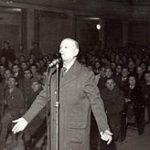 1877 – Born in the city of Elbasan, Lef Nosi, signer of the Declaration of Independence of Albania, patriot, archivist, folklorist, ethnographer, numismatist, archaeologist and Albanian politician. He is known as the father of Albanian philately, a personality with broad cultural interests. His socio-political activity was almost inseparable from his personal one. The crowded national activity soon made Lef Nosi the object of persecution for the Ottoman authorities. Lef Nosi’s idea for the New Albanian State took shape in the political program that together with Faik Konica was printed in London in 1907. The political movement would be called Ana Kombëtare and its program contained 24 points. With the fascist occupation, Nosi was exiled to Italy with Mehdi Frashëri and Rauf Ficon, where he did not stop his activity for the benefit of the country. He returned to his homeland in 1942, where he met Ali Këlcyra, Mit’hat Frashëri, etc. to inaugurate the National Front movement, with whose co-leaders there would also be disagreement. Fluent in Turkish, Greek, French, German and Italian. Contemporaries say that Lef Nosi had the second library in Albania, after the library of Mit’hat bej Frashëri. The core of the fund of Albanology and Balkanology in the public library “Qemal Baholli” in Elbasan, bears the personal stamp of Lef Nosi. Lef Nosi has given a great contribution to the library “Qemal Baholli” of the city, since its establishment, being also in the scientific council of the library of that time. After 1990, he was honored as a prominent patriot, in a ceremony organized in his hometown, with the special participation of the Nosi family, his granddaughter, Adelina Kosturi (Nosi) and her son, Skënder Kosturi. In 2004, he was named “Honorary Citizen” of Elbasan. A street in Elbasan is named Lef Nosi. A high school in Prizren bears his name. In 2007, he was decorated with the order “Gjergj Kastrioti Skënderbeu”. He has been described by his friends and relatives as an “academic” and a “national figure”, more a “philologist” than a “politician”. Under the high care of the Minister of Education and Science prof. dr. Myqerem Tafaj, on the 100th anniversary of the declaration of Independence, University of Elbasan “A. Xhuvani ”, in cooperation with the Center for Albanological Studies and the municipality of the city of Elbasan, organize the scientific session Lef Nosi, a central figure of Albanian history and culture.
1877 – Born in the city of Elbasan, Lef Nosi, signer of the Declaration of Independence of Albania, patriot, archivist, folklorist, ethnographer, numismatist, archaeologist and Albanian politician. He is known as the father of Albanian philately, a personality with broad cultural interests. His socio-political activity was almost inseparable from his personal one. The crowded national activity soon made Lef Nosi the object of persecution for the Ottoman authorities. Lef Nosi’s idea for the New Albanian State took shape in the political program that together with Faik Konica was printed in London in 1907. The political movement would be called Ana Kombëtare and its program contained 24 points. With the fascist occupation, Nosi was exiled to Italy with Mehdi Frashëri and Rauf Ficon, where he did not stop his activity for the benefit of the country. He returned to his homeland in 1942, where he met Ali Këlcyra, Mit’hat Frashëri, etc. to inaugurate the National Front movement, with whose co-leaders there would also be disagreement. Fluent in Turkish, Greek, French, German and Italian. Contemporaries say that Lef Nosi had the second library in Albania, after the library of Mit’hat bej Frashëri. The core of the fund of Albanology and Balkanology in the public library “Qemal Baholli” in Elbasan, bears the personal stamp of Lef Nosi. Lef Nosi has given a great contribution to the library “Qemal Baholli” of the city, since its establishment, being also in the scientific council of the library of that time. After 1990, he was honored as a prominent patriot, in a ceremony organized in his hometown, with the special participation of the Nosi family, his granddaughter, Adelina Kosturi (Nosi) and her son, Skënder Kosturi. In 2004, he was named “Honorary Citizen” of Elbasan. A street in Elbasan is named Lef Nosi. A high school in Prizren bears his name. In 2007, he was decorated with the order “Gjergj Kastrioti Skënderbeu”. He has been described by his friends and relatives as an “academic” and a “national figure”, more a “philologist” than a “politician”. Under the high care of the Minister of Education and Science prof. dr. Myqerem Tafaj, on the 100th anniversary of the declaration of Independence, University of Elbasan “A. Xhuvani ”, in cooperation with the Center for Albanological Studies and the municipality of the city of Elbasan, organize the scientific session Lef Nosi, a central figure of Albanian history and culture.
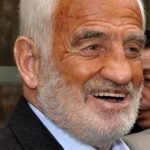 1933 – Jean-Paul Paul Belmondo is born in Paris. Belmondo, is a French actor originally associated with the New Wave of the 60s and one of the biggest stars of the French film of the 60s, 70s, and 80s. His most popular credits include Breathless, and That Man from Rio. Some of his other films are The Professional, The Thief of Paris, Chocolat, and Les Miserables.
1933 – Jean-Paul Paul Belmondo is born in Paris. Belmondo, is a French actor originally associated with the New Wave of the 60s and one of the biggest stars of the French film of the 60s, 70s, and 80s. His most popular credits include Breathless, and That Man from Rio. Some of his other films are The Professional, The Thief of Paris, Chocolat, and Les Miserables.
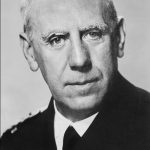 1945 – Wilhelm Canaris, 58, is executed in a concentration camp in Flossenburg. Canaris, was a German admiral and chief of the Abwehr, the German intelligence service, from 1935 to 1944. Initially a supporter of Adolf Hitler, until 1939 he had turned against the regime. During World War II, he was among the officers involved in the clandestine opposition to Nazi Germany’s leadership.
1945 – Wilhelm Canaris, 58, is executed in a concentration camp in Flossenburg. Canaris, was a German admiral and chief of the Abwehr, the German intelligence service, from 1935 to 1944. Initially a supporter of Adolf Hitler, until 1939 he had turned against the regime. During World War II, he was among the officers involved in the clandestine opposition to Nazi Germany’s leadership.
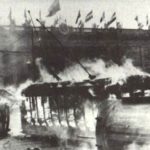 1948 – The assassination of Jorge Eliecer Gaitan provokes a violent riot in Bogotá and ten more years of violence in Colombia. The 10-hour riot destroyed much of Bogota’s city center. The aftermath of Gaitan’s assassination continued in the village and escalated into a period of violence that began eighteen years earlier, in 1930, caused by the fall of the conservative party by the government and the rise of the Liberals.
1948 – The assassination of Jorge Eliecer Gaitan provokes a violent riot in Bogotá and ten more years of violence in Colombia. The 10-hour riot destroyed much of Bogota’s city center. The aftermath of Gaitan’s assassination continued in the village and escalated into a period of violence that began eighteen years earlier, in 1930, caused by the fall of the conservative party by the government and the rise of the Liberals.
 1959 – During the Mercury Project, NASA announces the selection of the first seven astronauts in the United States, whom the news media quickly dubbed the “Mercury Seven.” The Mercury Seven were the group of astronauts chosen to fly the ship to Mercury. These seven American-born astronauts were Scott Carpenter, Gordon Cooper, John Glenn, Gus Grissom, Wally Schirra, Alan Shepard, and Deke Slayton.
1959 – During the Mercury Project, NASA announces the selection of the first seven astronauts in the United States, whom the news media quickly dubbed the “Mercury Seven.” The Mercury Seven were the group of astronauts chosen to fly the ship to Mercury. These seven American-born astronauts were Scott Carpenter, Gordon Cooper, John Glenn, Gus Grissom, Wally Schirra, Alan Shepard, and Deke Slayton.
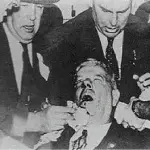 1960 – Dr. Hendrik Verwoerd, South Africa’s prime minister, and apartheid architect, narrowly survives an assassination attempt by a white farmer, David Pratt, in Johannesburg. But in 1966 he would be assassinated in front of parliament by Dimitri Tsafendas, because of his racist and segregationist policies towards people of color and other ethnic minorities in the Republic of South Africa.
1960 – Dr. Hendrik Verwoerd, South Africa’s prime minister, and apartheid architect, narrowly survives an assassination attempt by a white farmer, David Pratt, in Johannesburg. But in 1966 he would be assassinated in front of parliament by Dimitri Tsafendas, because of his racist and segregationist policies towards people of color and other ethnic minorities in the Republic of South Africa.
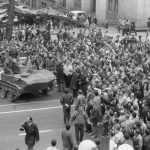 1989 – The Tbilisi Massacre takes place. A peaceful anti-Soviet demonstration and a hunger strike in Tbilisi, demanding the restoration of Georgia’s independence, are dispersed by the Soviet Army, resulting in 20 dead and hundreds wounded. On April 10, Tbilisi and the rest of Georgia went on strike and a 40-day black period was declared. People brought large collections of flowers to the murder scene. A state of emergency was declared, but demonstrations continued.
1989 – The Tbilisi Massacre takes place. A peaceful anti-Soviet demonstration and a hunger strike in Tbilisi, demanding the restoration of Georgia’s independence, are dispersed by the Soviet Army, resulting in 20 dead and hundreds wounded. On April 10, Tbilisi and the rest of Georgia went on strike and a 40-day black period was declared. People brought large collections of flowers to the murder scene. A state of emergency was declared, but demonstrations continued.
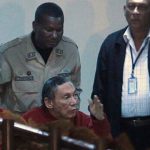 1992 – A US federal court finds former dictator Panamez Manuel Noriega guilty of drug and advertising charges. He is sentenced to 30 years in prison. He was a Panamanian politician and military officer who was the de facto ruler of Panama from 1983 to 1989. He had long ties to the United States however, he was removed from power by the American occupation of Panama.
1992 – A US federal court finds former dictator Panamez Manuel Noriega guilty of drug and advertising charges. He is sentenced to 30 years in prison. He was a Panamanian politician and military officer who was the de facto ruler of Panama from 1983 to 1989. He had long ties to the United States however, he was removed from power by the American occupation of Panama.
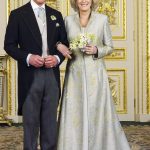 2005 – Prince of Wales Charles marries Camilla Parker Bowles at a civil ceremony in Windsor Guildhall. The ceremony, held in the presence of the couple’s families, was followed by the Prayer and Dedication Service at St. George’s Church, which included an act of penance. The groom’s parents, Queen Elizabeth II and Prince Philip, Duke of Edinburgh, did not attend the civil wedding ceremony but were present at the Prayer and Dedication Service.
2005 – Prince of Wales Charles marries Camilla Parker Bowles at a civil ceremony in Windsor Guildhall. The ceremony, held in the presence of the couple’s families, was followed by the Prayer and Dedication Service at St. George’s Church, which included an act of penance. The groom’s parents, Queen Elizabeth II and Prince Philip, Duke of Edinburgh, did not attend the civil wedding ceremony but were present at the Prayer and Dedication Service.






